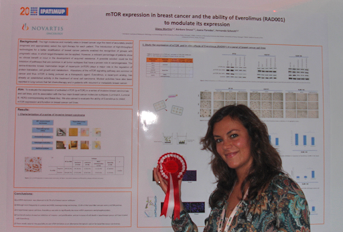Associação Portuguesa de Investigação em Cancro
ESMO distingue Diana Martins (IPATIMUP) com o «Best Poster Award» na categoria de Cancro da Mama
ESMO distingue Diana Martins (IPATIMUP) com o «Best Poster Award» na categoria de Cancro da Mama

Diana Martins was awarded with the «Best Poster Award» at the European Society for Medical Oncology (ESMO) 2012 Congress, which occurred in Viena, Austria. The results within the poster revealed that there is a significant higher frequency of p-mTOR in the very aggressive basal-like tumors, compared with the other breast cancer subtypes. Importantly, functional studies showed an inhibition of invasion and proliferation and an increase of cell death in basal breast cancer cell lines treated with Everolimus, which raised the possibility to use mTOR inhibitors as an alternative therapeutic option for basal-like breast carcinomas, which still do not have a targeted therapy to be currently used in the clinics.
Abstract:
mTOR expression in basal-like breast cancer and the ability of Everolimus to inhibit the invasion cancer cell capacity
Diana Martins<1,2, Bárbara Sousa1,2, Joana Paredes1,3, Fernando Schmitt1,3
1IPATIMUP- Institute of Molecular Pathology and Immunology of the University of Porto, Porto, Portugal;
2ICBAS- Institute of Biomedical Sciences Abel Salazar, University of Porto, Portugal;
3FMUP- Medical Faculty of the University of Porto, Porto, Portugal.
The introduction of high-throughput technologies in breast cancer enabled the recognition of groups with prognostic value, in which target-therapies can be applied. However, a relevant percentage of patients show no clinical benefit or incur in the development of acquired resistance. A possible solution could be the inhibition of pathways that are common in all tumor subtypes that have a proven role in carcinogenesis. Alterations of the serine-threonine kinase mammalian target of rapamycin (mTOR) signaling pathway are common in cancer and thus mTOR is being pursued as a therapeutic agent. Everolimus, a rapamycin analog, has already an established activity in the treatment of renal cell carcinoma.
In this study, we proposed to evaluate the expression of activated mTOR in a large series of invasive carcinoma samples and cell lines, and its association with the four main molecular subtypes (Luminal A, Luminal B, HER2-overexpressing and Basal-like). We also aimed to evaluate the ability of Everolimus to inhibit mTOR expression and function in breast cancer cells.
p-mTOR expression was found in 66.7% (231/348) of the invasive breast carcinoma cases analysed. Considering the molecular subtypes of breast carcinomas, p-mTOR was more frequently observed in basal-like breast carcinomas (80.6%).
All breast cancer cell lines, representative of distinct molecular subtypes, showed expression of total and activated mTOR. These cells have been treated with RAD001, in order to assess their sensitivity to this drug, and all cell lines showed a decrease of p-mTOR expression after everolimus treatment. Due to the higher prevalence of p-mTOR in basal-like tumors, we treated three basal-like cell lines with Everolimus to assess the effects on cell invasion and aggregation. Cell invasion was significantly inhibited in response to Everolimus.
The results revealed that there is a significant higher frequency of p-mTOR in basal-like tumors, compared with the other subtypes. In addition, Everolimus is able to significantly decrease mTOR expression and activity, inhibiting invasion capacity of basal-like breast cancer cells emphasizing the antitumour activity of mTOR inhibitors in breast cancer models.






